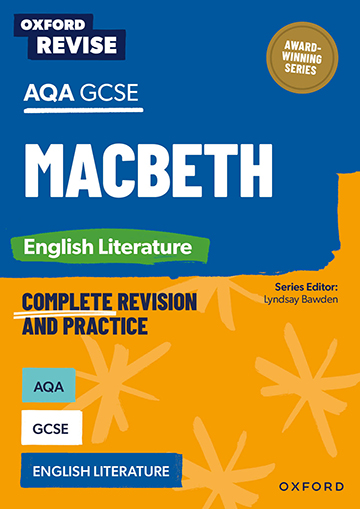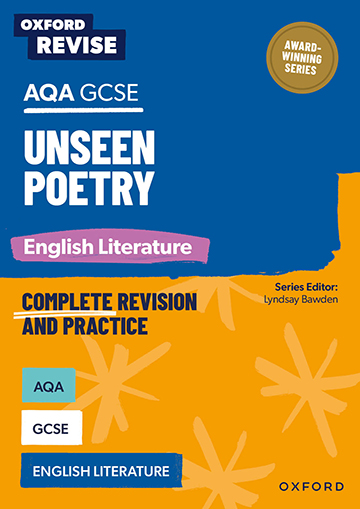Your AQA GCSE English Literature exam explained with Lyndsay Bawden
Taking AQA GCSE English Literature? One of the first things you should do when you begin preparing for your exams is to ensure that you understand what to expect on exam day. Lyndsay Bawden, series editor of Oxford Revise AQA GCSE English Literature, is here to talk you through just that!
Learn more about the breakdown of each paper in detail, what each section will contain, and the types of questions to prepare for.
Understanding the requirements of each paper will ensure that you revise effectively, and help calm those pre-exam nerves. Remember, you’ve got this!
AQA GCSE English Literature Exam Explained: Introduction
Hi, I’m Lyndsay Bawden – English teacher, textbook author, and trainer of English teachers. I’m here to walk you through what to expect in your AQA GCSE English Literature exam, so you can feel confident and prepared when exam day arrives.
Paper 1: Shakespeare and the 19th century novel
There are two exam papers. Paper 1 is all about Shakespeare and the 19th century novel. This might be a play such as Macbeth, Romeo and Juliet or The Tempest. And novels such as a Christmas Carol, Jekyll and Hyde or Pride and Prejudice.
You get 1 hour and 45 minutes for this paper, which means roughly 50 minutes for each section.
Section A: Shakespeare
In Section A, The Shakespeare section, you’ll be given an extract from your play and a question that asks you to analyse it in relation to the text as a whole.
Make sure you explore both the extract and the wider text, discussing themes or characters, and the writers ideas and messages in relation to the question.
Section B: 19th century novel
In Section B on your 19th Century novel, you’ll have a similar set-up. An extract followed by a question, that you also link to the whole novel. Planning your response is key. Ensure you reference the extract directly, but also show strong knowledge of the entire novel.
Answer the question throughout and show that you know the writer’s ideas.
Paper 2: Modern texts and poetry
Paper 2 is longer, it is 2 hours and 15 minutes. It could be even longer if you have more time. And it covers modern text, poetry and unseen poetry.
Section A: Modern texts
Section A is your modern texts, where you might have studied text such as An Inspector Calls or Blood Brothers, Lord of the Flies or Animal Farm.
You will write one essay and you’ll have a choice of two questions, usually focused on a character or a theme. No extract is given so knowing your text inside and out is crucial.
Section B: Poetry Anthology
Section B is the poetry anthology. You’ll have to compare a named poem from your studied anthology, which might be Power and Conflict, Love and Relationships or The Worlds and Lives anthology.
And you compare one poem from your choice from the same collection. And so there’s the named poem and then you choose a second one to go along with it.
That means that you’ll need to know all 15 poems very well, including their themes, the writers ideas and how the writers convey their ideas. Also known as the methods the writers use.
Section C: Unseen Poetry
Section C is Unseen Poetry, where you will be given two poems you’ve never seen before. The first task, you complete an answer on a question on one poem. Then the final task on the paper is to write about both poems in one shorter answer.
This section tests your ability to respond to poetry and show that you understand its meanings, and how the writer conveys those meanings on the spot. So practising with unseen poems beforehand is really important.
AQA GCSE English Literature Exam Explained: Top tips for Success
So top key takeaways, to prepare for your GCSE English Literature exams for AQA.
Firstly practice exam questions. Writing under time conditions is essential. Know what to expect. Make sure you understand the format of each paper and the types of questions. Make sure you answer the questions that are set, not the ones you wish had been set. Make sure you prepare by knowing your text really well before you go into the exam.
Best of luck with your exams!
For more GCSE support, read Lyndsey’s top tips on how to revise effectively for your exams – and how to make them enjoyable, too!
Found this article useful? If so, keep learning by watching more from Lyndsey Bawden on the Oxford Revise YouTube Channel.
GCSE English Literature Revision Guides
Useful links
Revision resources

Oxford Revise: AQA GCSE English Literature: Macbeth
This guide covers everything that you need to revise for Macbeth as part of AQA GCSE English Literature.

Oxford Revise: AQA GCSE English Literature: Unseen Poetry
This guide covers everything that you need to revise for Unseen Poetry as part of AQA GCSE English Literature.